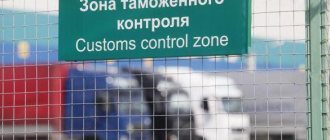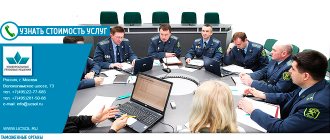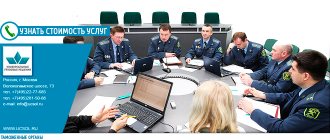Customs law regulates customs relationships that arise in connection with the movement of goods and vehicles across the state border.
Definition 1
Customs law is understood as a complex branch of legal norms established by the state and intended to regulate social relations related to trade turnover across the state border, collection of duties, customs operations, as well as issues related to foreign and domestic policy.
Digital library
Jurisprudence / Customs law / 2.4 Subjects of customs law: concept and types
A subject of law in any legal field is generally considered to be a bearer of certain rights and obligations with which he is endowed by the state to realize his vital needs, or the powers assigned to him in the relevant sphere of social relations. Therefore, subjects of Russian customs law should be understood as persons (both individuals and legal entities) who are endowed by the state with the ability to be bearers of legal rights and obligations in the field of customs affairs. These include:
· customs authorities and institutions of the customs authorities system;
· civil servants of customs authorities and institutions of the customs authorities system;
· legal entities;
· individuals.
The concept of “subject of law” is closely related to the concept of legal personality, which includes such properties of the subject as legal capacity and legal capacity. Taking into account legal capacity, i.e. the possibility of a subject established in law to be a bearer of certain rights and obligations, subjects of customs law can be divided into two groups: special and other subjects.
To special subjects
customs law is covered by customs authorities and civil servants of customs authorities and institutions of the system of customs authorities - entities with special legal capacity in the field of customs affairs. Their specificity lies in the competence of customs authorities established by the norms of customs law as federal executive authorities regulating legal relations in the field of customs, as well as in the scope of specific rights and obligations of a civil servant of a particular customs authority or institution of a system of customs authorities to implement the competence of customs authorities.
To other subjects
customs law includes legal entities and individuals (both Russian and foreign) who do not have special legal capacity in the field of customs affairs. The totality of their rights and obligations as subjects of customs law depends on their legal status. So, for example, according to Part 1 of Art. 12 of the TMK of the Russian Federation, all persons on an equal basis have the right to move goods and vehicles across the customs border in the manner established by the Customs Code of the Russian Federation and other acts of legislation on customs affairs. But the procedure and conditions for such movement are largely determined by what legal status (status of a Russian person, status of a legal or natural person, etc.) has the person moving goods across the customs border of Russia.
Subjects of customs law
Subjects in any area are considered to be bearers of the rights and responsibilities granted by the state in order to realize certain vital needs or powers in a certain area.
Are you an expert in this subject area? We invite you to become the author of the Directory Working Conditions
Definition 2
If we consider the subjects of customs law, then they are understood as both individuals and legal entities that are endowed by the state with legal rights and responsibilities in the field of customs law.
The subjects of customs law include:
- civil servants of customs authorities,
- Customs
- legal entities and individuals
Due to the fact that bearers can be endowed with rights and responsibilities, subjects of customs law are divided into special and other subjects.
Customs authorities and civil servants of customs authorities, including organizations related to the customs service, are considered special subjects of customs law. These organizations have special legal capacity in the field of customs law.
Other subjects of customs law are legal entities and individuals (including foreign ones). These entities do not have special legal capacity in the field of customs law. Their rights and obligations depend on their legal status.
Finished works on a similar topic
Course work Subjects and objects of customs law 470 ₽ Abstract Subjects and objects of customs law 240 ₽ Test work Subjects and objects of customs law 220 ₽
Receive completed work or specialist advice on your educational project Find out the cost
DUTIES AND RESPONSIBILITIES OF A CUSTOMS BROKER:
- 1Comply with the conditions for inclusion in the Register;
- 2Submit reports to the Federal Customs Service of Russia once every six months;
- 3Do not disclose, use for your own purposes or transfer to other persons information that is secret and confidential information;
- 4Fulfill the obligation to pay customs duties and taxes;
- 5Inform the Federal Customs Service about changes in the information declared when included in the Register;
- 6Publish information on the cost of services on the website and inform the Federal Customs Service about this;
- 7Comply with restrictions on your activities, if any.
The customs representative bears a joint and several obligation with the declarant to pay customs duties, taxes, interest, penalties, customs fees in the full amount of the duty to pay customs duties.
ADVANTAGES OF A CUSTOMS BROKER:
- A customs broker has the same rights in relation to the cargo as the customer of his services - he carries out all operations as if he himself were moving the goods across the border.
- The ability to sell related services to clients – certification, delivery, import “under a broker’s contract”, etc.
- There is no need to obtain the client’s digital signature - the broker submits the declarations under his own seal.
- The ability to reduce costs for specialized services, etc.) taking into account the volume of the broker.
- A broker's awareness in the field of foreign trade is greater than that of just a foreign trade participant = greater professionalism. But often this is not the case.
Disadvantages of customs BROKER status:
- The activity is licensed. There are conditions and difficulties when including in the Register. How to get status? – we told you here just for you.
- Once every six months it is necessary to submit reports to customs. It's not difficult, we'll teach you.
- Ensuring payment of payments of 500 thousand Euros (for a broker without activity restrictions).
- Responsibility to customs for customer cargo, including payment of payments.
- Risk of exclusion from the Register for a number of reasons.
RELATIONSHIP OF THE BROKER WITH THE CLIENT (PARTICIPANT OF FEATHER TRADE)
- 1The broker and the client enter into an agreement.
- 2The client sends the broker documents for customs clearance in advance.
- 3The broker prepares and submits a goods declaration.
- 4The client pays for the broker's services.
WHAT IS THE COST OF BROKER SERVICES?
Friend, let's dig into their financial kitchen? Here she is:
- 1Bank guarantee for 500 thousand Euros = approximately 38 million rubles. The guarantee costs the broker 2% of this amount per year (from 760,000 rubles).
- 2Costs for a temporary storage warehouse, if the cargo is registered at a temporary storage warehouse. Rates vary, from 3,000 rubles.
- 3Costs for office, personnel and specialized software.
- 4Costs on loyalty and “issue resolution”. Well, you get the idea.
What does a customs representative do?
The main task of the customs representative is to know the details that will allow the client not to pay extra and take into account all mandatory expenses. So, what can a customs representative help with:
- will calculate all delivery costs, from logistics to customs duties;
- draw up a list of documents for customs clearance: you will know exactly what needs to be prepared; and, say, a notification from the FSB when importing an innocent children's toy will not come as a surprise once the cargo arrives at the terminal;
- will collect and check all documents for compliance with customs requirements: for example, a contract for a foreign economic transaction at Meridian is checked by a lawyer and chief accountant. They give recommendations for adjustments and offer to coordinate them with the foreign partner;
- will check whether the price is “passable”: this is the most important parameter in the declaration - too high a price of an imported product may raise suspicion of transferring currency abroad, and too low - in an attempt to reduce the amount of customs duties;
- will advise you on the need for certification: chairs imported for restaurant furnishings require a declaration of compliance with the technical regulations of the Customs Union, but the same chairs imported for your own office are exempt from such a requirement - an experienced broker will guide you based on the conditions of your delivery;
- will submit a declaration and communicate with the inspector: for this, the broker has separate specialists who are called declarants; They are the ones who take upon themselves the correct filling out of the declaration, submission of the collected package of documents and processing of questions and clarifications of the inspecting inspector.
Errors at any of the stages described above mean not only wasted time and money, but also the risk of receiving a case of an administrative offense from the Federal Customs Service. Moreover, if the amount of lost customs payments exceeds 2 million rubles, then a criminal case will be initiated. In addition, if you have chosen the wrong code, the Customs House will correct it, which means the amount of customs duties may change. The set of documents required for customs clearance may also change.
Question 2. Legal entities as subjects of customs legal relations.
Topic 4. Individuals and legal entities as subjects of customs legal relations
Questions:
1. Individuals as subjects of customs legal relations.
2. Legal entities as subjects of customs legal relations.
3. Legal status of persons carrying out certain types of activities in the field of customs affairs:
a) customs representative;
b) customs carrier;
c) owner of a temporary storage warehouse;
d) owner of the customs warehouse;
e) owner of a duty-free shop;
f) authorized economic operator.
Question 1. Individuals as subjects of customs legal relations.
The movement of goods across the customs border is always carried out by specific persons. According to Article 4 of the CU Labor Code, a person is an individual and (or) legal entity, as well as an organization that is not a legal entity, unless otherwise follows from the CU Labor Code itself.
individuals - citizens of the Russian Federation, foreign citizens and stateless persons - take an active part in the movement of goods across the customs border They can move to another state for permanent residence, travel, or go abroad for study or work. Individual subjects become participants in customs legal relations in cases where they cross the state border of the Russian Federation and at the same time move (in the present or future) goods across the customs border.
The last circumstance is decisive in the issue of acquisition by persons of special customs legal personality. Customs legal personality is the ability of an individual and legal entity to be a participant in legal relations developing in the field of customs, including exercising rights, fulfilling duties, and incurring legal liability .
Citizen of the Russian Federation
a person is recognized as having a close legal connection with the Russian Federation, expressed in the totality of their mutual rights and obligations[1]. At the same time, a person’s residence outside the Russian Federation does not terminate his Russian citizenship[2]. A similar rule applies to the very fact of a citizen’s departure from the Russian Federation.
Foreign citizen
an individual who is not a citizen of the Russian Federation and has evidence of citizenship of a foreign state is recognized;
A stateless person
is an individual who is not a citizen of the Russian Federation and does not have evidence of citizenship of a foreign state[3]. These entities, regardless of whether they reside in Russia permanently or temporarily, are required to comply with current Russian legislation, including customs legislation.
Part 3 Art. 62 of the Constitution of the Russian Federation, Art. 4 of the Federal Law “On the Legal Status of Foreign Citizens in the Russian Federation” establishes a rule according to which foreign citizens and stateless persons enjoy rights in Russia and bear responsibilities on an equal basis with citizens of the Russian Federation, except in cases established by federal law or an international treaty of the Russian Federation.
All individuals on an equal basis have the right to move goods across the customs border in compliance with the provisions established by the customs legislation of the Customs Union and the legislation of the member states of the Customs Union (Clause 1, Article 150 of the Customs Code of the Customs Union).
In this case, goods can be moved across the customs border both for personal consumption and for commercial and other production purposes. Most people cross the border in pursuit of international tourism, which has been booming in recent years.
A simplified customs clearance procedure is established for persons entering the territory of the Customs Union
, provided that they do not have a large number of goods.
If an individual moves goods not for commercial use, he performs customs procedures in a preferential manner
, which is based on full
or partial exemption from customs duties
, non-application of non-tariff foreign trade regulation measures to goods (for example, certification), simplified customs clearance.
In accordance with Article 358 of the Labor Code of the Customs Union, foreign individuals have the right to temporarily
import into the customs territory of the Customs Union
:
1) goods for personal use
, the list of which is determined by the international treaty of the CU member states[4], with the exception of vehicles,
with exemption from customs duties
for the period of their stay in this territory;
2) vehicles for personal use
registered on the territory of foreign states, for the period of their temporary stay, but not more than one year,
with exemption from customs duties
.
Temporarily imported goods for personal use must be exported back from the customs territory of the Customs Union upon expiration of the period of legal stay of the foreign citizen in this territory . In this case, re-export is allowed through any customs authority located on the territory of the Customs Union (Part 4, Article 358 of the Customs Code of the Customs Union).
If such goods are not exported after the established period, customs duties and taxes are levied on them in the manner established by the customs legislation of the Customs Union (Part 5, Article 358 of the Customs Code of the Customs Union).
Goods transported across the state border of the Russian Federation within the customs territory of the Customs Union are not subject to customs duties , regardless of whether they are transported by individuals or legal entities, for commercial or personal use.
General rules for the movement of goods for personal use in relation to individuals of the CU member states are established in Article 359 of the CU Labor Code. These persons have the right to temporarily export goods for personal use from the customs territory of the Customs Union for the duration of their temporary stay in the territory of a foreign state and import them back with exemption from customs duties and taxes[5].
Individuals, entering into customs legal relations, may commit illegal actions, i.e. become delinquents. Citizens bear administrative responsibility for violating customs rules provided they reach 16 years of age at the time of committing the offense (Article 2.3 of the Code of Administrative Offenses of the Russian Federation). Foreign citizens and stateless persons who have committed administrative offenses on the territory of the Russian Federation are subject to administrative liability on a general basis (Article 2.6 of the Administrative Code), i.e. also from the age of 16.
The specifics of bringing to administrative and criminal liability are defined in the Agreement on the Peculiarities of Criminal and Administrative Liability for Violations of the Customs Legislation of the Customs Union and the Member States of the Customs Union
dated July 5, 2010 (ratified by Federal Law dated April 5, 2011 N 59-FZ).
A special place among individual subjects of customs legal relations is occupied by individuals permanently residing in the Russian Federation and registered as individual entrepreneurs. In the field of customs affairs, they are treated as legal entities . This means that they are not subject to the simplified customs clearance procedure and benefits for paying customs duties.
Question 2. Legal entities as subjects of customs legal relations.
Enterprises, institutions, organizations moving goods and (or) vehicles across the customs border are recognized as collective subjects of customs legal relations
.
Most of them are participants in export-import operations. They are divided into the following categories:
direct participants in export-import operations (legal entities, organizations, individuals - individual entrepreneurs);
persons servicing foreign trade relations (credit organizations, postal and transport enterprises);
diplomatic and consular missions of foreign states, international interstate and intergovernmental organizations;
legal entities carrying out certain types of activities in the field of customs affairs on the basis of a special certificate (customs representative, customs carrier, owners of temporary storage warehouses, customs warehouses, authorized economic operator).
Direct participants in export-import operations , as a rule, act as a declarant
, i.e. the person entrusted with the responsibility for carrying out customs operations (see clause 6, part 1, article 4 of the Customs Code of the Customs Union)[6]. Declarants submit to the customs authorities the documents and information necessary for the release of goods (Article 176 of the Customs Code of the Customs Union); carry out customs declaration of transported goods (part 2 of article 179 of the Customs Code of the Customs Union); pay customs duties (Article 79 of the Customs Code of the Customs Union); are required to comply with non-tariff regulation measures, etc.[7].
The legal status of a legal entity as a subject of customs legal relations is unthinkable without defining the range of its rights, duties and responsibilities. Article 187 of the Customs Code of the Customs Union establishes a list of the rights of the declarant during the customs declaration of goods and performing other customs operations necessary for placing goods under the customs procedure, namely the rights:
1) inspect, measure and carry out cargo operations with goods under customs control;
2) take samples and specimens of goods under customs control with the permission of the customs authority;
3) be present during the customs inspection and customs examination of goods by customs officials and when these persons take samples of goods;
4) get acquainted with the results of studies of samples and specimens of the goods declared by him, available at the customs authorities;
5) submit documents and information in electronic form;
6) appeal decisions, actions (inaction) of customs authorities and their officials;
7) attract experts to clarify information about the goods declared by him;
 other rights in accordance with specific articles of the Labor Code of the Customs Union.
other rights in accordance with specific articles of the Labor Code of the Customs Union.
Article 188 of the Customs Code of the Customs Union establishes a list of responsibilities of declarants . The latter are obliged:
1) make customs declaration of goods;
2) submit to the customs authority the documents on the basis of which the customs declaration has been completed;
3) present the declared goods in cases provided for by the Customs Code of the Customs Union, or at the request of the customs authority;
4) pay customs duties and (or) ensure their payment;
5) comply with the requirements and conditions for the use of goods in the relevant customs procedure;
6) other duties in accordance with specific articles of the Labor Code of the Customs Union.
For failure to fulfill his duties (Article 188 of the Customs Code of the Customs Union), as well as for the statement of false information specified in the customs declaration, including when the customs authorities make a decision to release goods using a risk management system, the declarant is liable in accordance with the legislation of the state. members of the Customs Union (Article 189 of the Labor Code of the Customs Union).
Legal entities serving foreign trade relations are designed to help accelerate trade turnover between countries. The role of the banking system in the organization of customs affairs is determined by the need to regulate international monetary circulation and control the process of movement of money as a means of circulation and payment in the territories of the Russian Federation and foreign countries. So, according to paragraph 2 of Art. 136 of the Customs Code of the Customs Union, banks and other credit organizations of the CU member states provide, at the request of the customs authority, documents and information relating to the movement of funds through the accounts of organizations necessary for conducting a customs inspection
, including those containing bank secrecy in accordance with the legislation of the CU member states.
The exchange of international postal items is unthinkable without the coordinated work of postal enterprises, the status of which is determined by the national legislation of the Russian Federation[8].
These persons cannot act as declarants, because their functions are limited only to assistance in making monetary payments (banks), transporting goods (carrier), and providing freight forwarding services (forwarder).
Diplomatic (consular) missions of foreign states located on the territories of the CU member states can import into the customs territory of the CU and export from this territory goods intended for the official use of diplomatic missions
, with exemption from customs duties and taxes and without the use of non-tariff regulation measures (Article 318 of the Labor Code of the Customs Union).
The head of a diplomatic mission of a foreign state and members of the diplomatic staff, as well as members of their families living with them, if they do not reside permanently in the host state and are not citizens of the host state, may import into the customs territory of the Customs Union goods intended for their personal use, including goods for initial setup
, and export outside the customs territory of the Customs Union goods intended for their personal use, with exemption from customs duties, taxes and without the use of non-tariff regulation measures (Part 1, Article 319 of the Customs Code of the Customs Union).
A similar rule applies to members of the administrative and technical staff of a diplomatic (consular) mission of a foreign state and members of their families living with them (see Article 320 of the Labor Code of the Customs Union).
The personal luggage of the head and members of the diplomatic staff of a diplomatic mission of a foreign state, as well as members of their families living with them, is exempt from customs inspection in the absence of serious grounds to assume that it contains goods not intended for personal use, or goods imported into the state. members of the Customs Union or whose export from the member states of the Customs Union is prohibited (Part 2, Article 319 of the Labor Code of the Customs Union).
Diplomatic mail and consular pouch (bag, suitcase) of foreign states transported across the customs border are not subject to opening or detention (Article 323 of the Labor Code of the Customs Union).
Who is a customs representative?
A customs representative - also known as a customs representative or a customs broker - is a company that is authorized to interact with customs on behalf of the importer or exporter and is fully responsible for the results of such interaction.
The customs representative takes over the entire cycle of customs clearance: collecting and preparing documents, calculating payments, filing a declaration, responding to customs requests, communicating with the inspector. Working daily with different clients and cargo, the manager is always aware of legislative innovations, the entry into force of new by-laws and recommendations of relevant ministries.
Some customs representatives have the status of an authorized economic operator, which provides significant preferences when crossing the border: deferment of customs duties, acceleration of all procedures, lack of currency control, and others. Such a broker can be assigned to become a technical importer to take advantage of these benefits. In this case, the client buys the imported goods on the territory of the Russian Federation in rubles and with VAT from a customs broker and does not become a participant in foreign trade activities.
In addition to customs clearance, many customs brokers provide additional services that allow you to organize turnkey delivery, including: logistics, certification, assistance in labeling goods and others.







